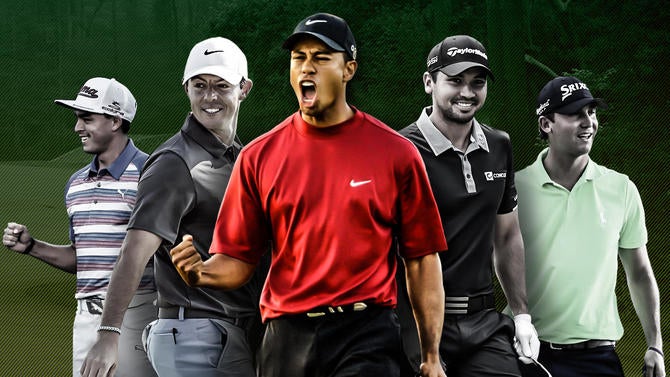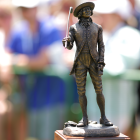There is conclusive empirical and anecdotal evidence that Tiger Woods' 12-stroke win at the 1997 Masters changed the sport's future and reshaped the entire landscape upon which the PGA Tour was built. We believed that then when he won. We know it for sure 20 years later.
Woods turned pro eight months prior to that Masters win in August 1996 at the Greater Milwaukee Open. He had long been playing at the level of a professional. It was then that he started being paid for his efforts.
A three-time U.S. Amateur champion, Woods' best finish as an amateur at the Masters had been a T41 in 1995 when he shot 5-over 293 to tie with Jeff Sluman, Payne Stewart and Mark Calcavecchia.
The Tiger of 1997 was a different Tiger, though. He was more prepared. His father, Earl Woods, and his swing coach, Butch Harmon, presumed something special was brewing at the beginning of the week.
"I believe he is [the guy to beat], yes,'' Harmon said at the time. "Everything we've done this year, all year, has been geared for the Masters. In the past, when he's focused on a single tournament, he has been very tough.''
You know the rest.
"What I remember about that was the hype and the build-up towards it and him especially," Rory McIlroy told CBS Sports. "Then obviously he shoots 40 on the front nine. Then he comes back in 30 and from there goes on a tear."
Tiger Woods left the greatest golfers on the planet slack-jawed with three and a half rounds of the greatest golf they had ever seen. Even more amazing than his front nine of 40 was his 22 under score over the next 63 holes. It was apocalyptic, and every single player, to a man, knew it.
There are innumerable ways to look at Woods' first of 14 major championships. He was a whirlwind of talent wrapped tightly in a body you could dream on. He was already famous. He had one of the great pedigrees in sports history. He was black.
"It means so much,'' Woods said after that win of being the first African-American to win the Masters. "I'm the first, but I wasn't the pioneer. Charlie Sifford, Lee Elder, Teddy Rhodes, those guys paved the way for me to be here. I thank them. If it wasn't for them, I might not have had the chance to play here.''
The importance of Woods winning as an African-American cannot be overstated, but neither can the fact that he was, at a time when golf was a stodgy middle-age man's sport, the youngest to ever win the tournament. That mattered nearly as much for the future as his cultural heritage meant for the past.
"As time goes on,'' Woods said in 1997 after winning, ''I think what we will see is, with my age, influence I've had on the game. I think more young people will start to play the game. I think that barrier, where young people haven't normally pursued golf, I think that now kids will think golf is cool, really. And I think they will start playing it.''

Woods might be the best to ever play the game, and he's definitely prophetic because kids did think it was cool, and now some of them are winning their own major championships.
They were pre-pubescents then. They are towers of the game now.
"I've watched the re-run of that Masters so many times, and I can tell you what he was wearing each day and the chip-in on 12 on Thursday, which really got him going," said McIlroy, 27. "That was a watershed moment for our generation. I watched him win his U.S. Amateurs as well. I was a massive Tiger fan even before that. But it really was just for the general golf public, Masters 1997 was huge."
"I was nine years old and I was getting into golf," said Jason Day, 29. "I mean I played golf ... at the time, and my dad had this turn knob TV with bunny ears and that's really what you did. You had to move the antenna to get the right picture, and it was really early in the morning. I remember him walking up the 18th, and he obliterated the field. [One of the two times] where Tiger really got me into golf was that moment when he won the '97 Masters. I started playing more golf than I usually did at that age."
"I probably watched the Masters the most, but that's probably one of my most memorable tournaments," said Rickie Fowler, 28. "Just because that was, I would have been, what would I have been? Eight? So it was right in my prime. I watched it multiple times and it definitely did not look like he had a chance to win, if you would have looked at him after nine holes."
"I remember pretty much that whole day," said PGA Tour rookie Wesley Bryan, 27. "That was right when I was getting into golf pretty serious. I was maybe seven years old. Watching him Sunday was unlike anything I'd really seen before. It's kind of my first golfing memory that I remember watching on TV. Then him finishing that off."
"I had a 1997 Masters poster with his fist pump in my room growing up," said Blayne Barber, 27. "Any time that highlight comes on even now I DVR it and watch it just because it's so awesome. That was obviously really cool to watch."
"I was 10 years old," said Kevin Chappell, 30. "Playing the game, enjoying the game. I really remember being for me like the passing of the people I looked up to early on in the game. I was a massive Greg Norman fan growing up, wearing the straw hat, the whole thing. So 1996 the letdown from him really brought the Masters to attention for me, and then all of a sudden turn it on the next year and there's Tiger Woods."
There's Tiger Woods.
It was the genesis of a 20-year run through the sport nobody had ever seen.
"That really set him on his way to becoming what I believe the best player ever even though the record might not be the best ever," said McIlroy. "That stretch of golf he played from then until he won the U.S. Open in 2008 is the best stretch of golf anyone has ever played."
The way Woods played mattered almost as much as the fact that he ever picked up a club at all. It was almost as if the game went from being shown in black and white (which hadn't happened in years) to being shown in high definition (which was still years away).
He was violent, and he dazzled in a way you were not supposed to within this sport. It was almost as if he took a skill set from another, faster, more exciting discipline and showed us what that looked like within this one.
"The way he played the game ... just drove you to go out and practice as a kid," said Barber. "Like, 'I'm Tiger Woods and this putt is to win the Masters' kind of thing."
"His desire to get better and never stop really helped me change the way I looked at the game," said Chappell. "When you're a kid, the goal is to play on the PGA Tour. Well that was never enough for Tiger Woods. His goals were so specific and detailed."
"It definitely taught me that I don't need to drive the ball in the fairway to succeed," said Bryan. "I don't quite have the motor that he has, but I definitely learned a lot of my creativity and kind of realizing that when you get into trouble that it's an opportunity to go out and show off the abilities that you have."
"It was his whole aura about him" said Ollie Schniederjans, 23. "His whole intensity that was relatable to other sports. The rest of golf seemed maybe sort of dull and it wasn't as fiery or fired up. He made it look competitive ... him chipping in on 16 [in 2005] is like watching someone throw down a dunk or somebody hit a home run. It was that kind of intensity or excitement that you just didn't know golf had that he brought that was relatable to other sports that kind of gets kids fired up."
"It made me love the game," said Smylie Kaufman, 25. "We always would go play golf after any major championship. We'd play in the dark. It was the best you get it every year was after the majors. It was always fun to go out there and play."
"It was impressive what he was able to do the next kind of 63 holes after going out the way he did," said Fowler. "So, something to kind of take from that. Something you have to learn a little bit on your one is you kind of have to, you just never give up, you never know when you may have that one nine holes where you blitz it and you're right back in it."
It is fitting that in the same year we will celebrate Arnold Palmer's legacy at the Masters, we will also remember that 1997 win by Woods. You could make the argument that those two have changed the trajectory of golf as a profession more than any other men or women -- ever.
"The talent pool gets better," Woods said a few years ago. "Kids are getting more athletic. They're going earlier. They'll be turning pro earlier than even I did. When I first came out here at 20, that was like, 'Whoa, you're coming out here pretty early.' Now we get kids turning pro at 15, 16. It's different. They're going to have more years where they can win more tournaments, and it's not easy to do."
Schniederjans agreed. "Higher level of athletes. Higher level of competition. You've just got a different game now," he said.
Woods is responsible for all of that.
"The guy that made us more money," added Kaufman. "He's obviously driven a bunch of our generation to the game just watching him play. The way he dominated and played just brought so many more people into the game. I'm very thankful for what Arnold did and then what Tiger did. Those two guys, what they did for the sport is -- without them two there would be no telling what we'd be playing for today. It's nice to be playing for as much money as we are."
"The only other player I would say changed golf as much as Tiger was Arnold," agreed McIlroy. "But I don't think anyone did as much for golf socially than Tiger with the people he brought into the game. The demographic of people he got interested in the game. I think from then until now the pool of people that now want to become successful at golf whether it's people from this country or others ... he had a massive influence on that.
"Instead of it being back in the 90s you had a certain section of people, and that's who played golf and wanted to play golf. All of a sudden it's gotten so much bigger. That's probably the biggest thing."
Woods infused the sport in so many different ways that talent, inspiration and money -- three of the biggest -- are just a few of them. But money might be the most important. Competition follows money, and there has never been more of either at this level of golf. When Woods won the Masters in 1997, he took home $486,000. That was a tidy sum at the time.
Even when you factor in inflation, though, this year's winner will take home nearly triple that. That's not all because of Woods, but I think everyone agrees his tide lifted all boats.
And it all started on a Thursday in Augusta some 20 years ago.
That win in 1997 -- that famous, historic, fist-pumping massacre -- is the most important golf victory since Nicklaus took Augusta at the age of 46 in 1986. It is a diversion dam in the river of time that reformatted everything we thought and everything we would think. What's more is that it will continue to reverberate into the future of this sport for an indeterminable amount of time.
Perhaps forever.





















